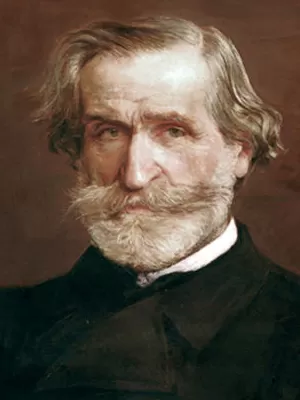Giuseppe Verdi
Composer
Giuseppe Verdi (October 1813 - January 1901)
Verdi was the major Italian musical dramatist of the nineteenth century, the successor to Bellini, Donizetti and Rossini. Along with Wagner, he was the most important opera composer of the period and received national and international recognition for his powerful stage works.
Whereas Wagner turned to myth and legend for inspiration and fashioned his own librettos, Verdi drew on dramas by figures such as Dumas, Hugo, Schiller and Shakespeare as the basis for his output, working closely with established librettists such as Piave and Boito.
While Verdi remained loyal to many of the well-established musical structures he inherited from the previous generation of Italian composers, e.g. the cavatina (a solo aria in distinct sections, moving from slow to fast), he did much to expand and refine the available forms and generate a more sophisticated style.
While in the middle period of his output (La traviata, for example) the ‘number’ opera principle of the bel canto composers still generally pertains, by the end of his career the edges of the distinct forms are far more blurred and works such as Otello feel through-composed.
Verdi’s harmonic language is simple and direct, gaining in subtlety and adventurousness as his career progressed. His orchestral writing always supports the vocal line and underlines the dramatic argument.
Verdi’s parents, though described as ‘innkeeper’ and ‘spinner’ on Giuseppe’s birth certificate, came from families of small landowners and traders – not the uneducated peasant classes which Verdi later like to claim. Perhaps this explains Verdi’s excellent business acumen in later life, when he not only managed a successful musical career but also administered a landed estate.
He showed early promise as a church organist at the age of 7 before beginning his formal musical training aged 12. Following studies in Milan, home to the famous La Scala opera house, Verdi made his earliest attempts at writing operas. But it was the premiere of Nabucco at La Scala, with its celebrated chorus of the Hebrew slaves, ‘Va pensiero’, that catapulted him to national fame. This chorus of longing for a homeland later became associated with the Italian nationalist movement.
The 1850s brought three operas whose popularity has never waned: Rigoletto (1851), based on ‘Le Roi S’amuse’ by Victor Hugo; Il trovatore (1853), based on a text by the Spaniard Gutiérrez; and La traviata (1853), based on Dumas’s story of a courtesan’s love affair with a respectable young man. Thereafter, Verdi never looked back and the premieres of his later Italian operas were all major cultural events, eagerly anticipated.
Although he effectively ‘semi-retired’ after Aida, he was persuaded back to the theatre for two final Shakespeare operas, his last – Falstaff – being premiered when he was 80.
While Verdi’s main focus was the lyric theatre, he did occasionally write in other genres, including the ever-popular Requiem (1874) and the Four Sacred Pieces (1887–96) for soloists, chorus and orchestra.
Bio courtesy of ENO.


